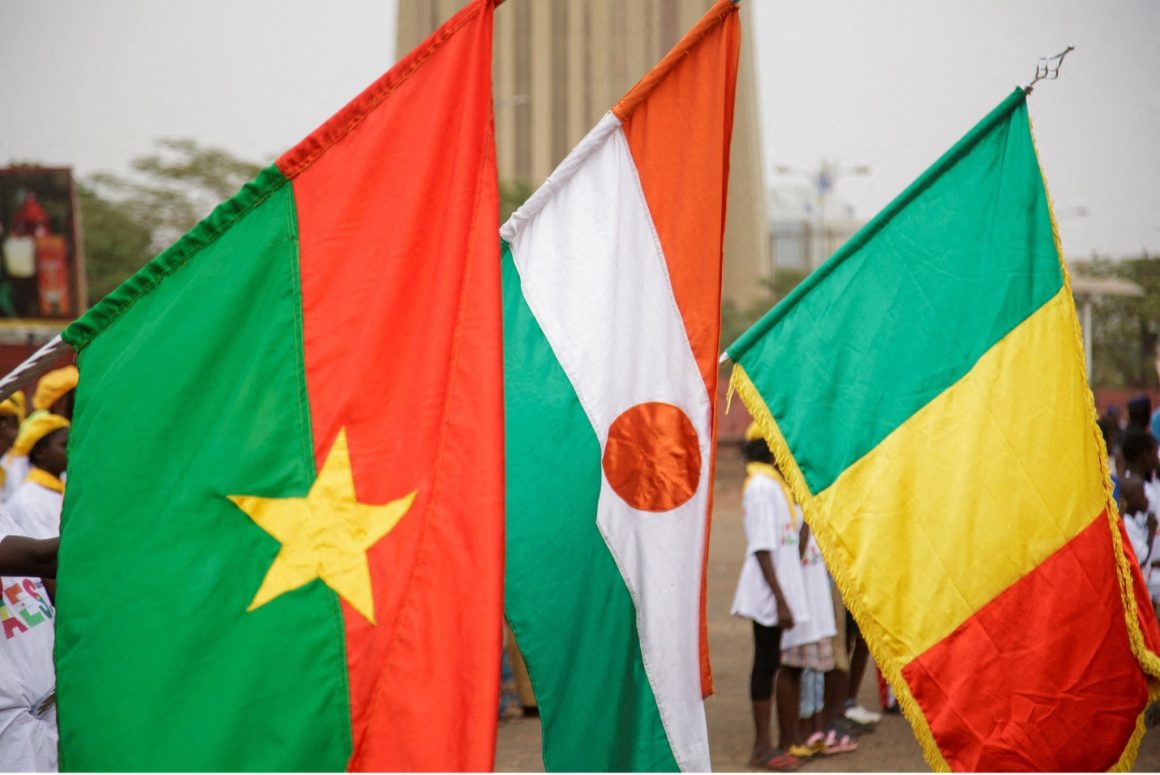On Saturday, 6 July 2024, in Niamey, capital of Niger, during the first meeting of the Alliance of Sahel States[1] (ASS/AES) a new agreement was signed to mark the beginning of the Confederated Alliance of the Sahel States[2]. According to the communiqué final of the summit, the former military Alliance of the Sahel States has officially become a confederation with a broader scope of increasing military security and fostering economic development free from Western influence.
The agreement has been unanimously signed by H.E. Captain Ibrahim Traore, Head of State of Burkina Faso; H.E. Colonel Assimi Goita, President of the Transition and Head of State of the Republic of Mali; and H.E. Brigadier General Abdourahamane Tiani, President of the National Council for the Safeguard of the Homeland, Head of State for the Republic of Niger.
With the establishment of the Confederation, General Tiani declared that the people had “irrevocably turned their backs” on the Economic Community of West African States (ECOWAS). The Niamey Summit came several months after these three countries signed the Liptako Gourma Military Aid Charter in September 2023 and jointly declared their intent to leave ECOWAS with immediate effect at the end of January 2024.
A new path to sovereignty
The newly confederated AES aims to prioritize the free movement of people and goods by creating a wide-reaching transport and communications infrastructure to support the industrial transformation by investing in the three nations’ agriculture, mines, and energy sectors. Furthermore, plans include establishing an investment bank and a stabilization fund.
Militarily speaking, the new Confederation will create a unified military force to combat terrorism and a permanent trilateral plan for military actions in case of aggression against a sovereign state. However, the extent to which the confederated AES will be able to harmonize political, economic, and defense policies remains uncertain, as the region continues to be plagued by insurgencies and financial challenges.
Diplomatically speaking, the Niamey Summit signaled a major departure from regional diplomatic coordination and alliances that were previously in place. The three countries have turned closer to Moscow, as the new bloc opened its arms to Russian mercenaries. The juntas’ policies redefine international influence in Central Sahel, fostering closer defense, diplomatic, and business ties with Russia and snubbing the former colonial power France, regional heavyweight Nigeria, and the United States.
ECOWAS Summit in Abuja
The Niamey Summit preempted by one day a special ECOWAS session that would have sought to persuade the three countries to reverse their decision to withdraw from the bloc. On Sunday, 7 July 2024, the 65th summit of ECOWAS was held in Abuja,Nigeria, where African leaders took up the critical issue of how to cope with the departure of the three countries and the newly established Confederation.
According to the official communiqué, “the Authority expresses disappointment with the lack of progress in engagements with the authorities of Burkina Faso, Mali, and Niger and instructs the President of the Commission to facilitate a more vigorous approach.”
As the return of the AES to ECOWAS remains an extremely marginal hypothesis, the Assembly designated H.E. Bassirou Diomaye Diakhar Faye, President of the Republic of Senegal as ECOWAS Facilitator in ECOWAS engagement with the Confederated AES in collaboration with H.E. Faure Essozimna Gnassingbé, President of the Togolese Republic.
An impossible coexistence?
ECOWAS has sought to persuade the three states to remain part of the bloc through diplomatic means. The split will risk tearing apart decades of regional integration, notably the challenge of managing a messy economic disentanglement of the Confederated AES countries from ECOWAS’ trade and services flows valued at nearly $150 billion a year.
From their side, the AES leaders have made numerous belligerent statements about ECOWAS, suggesting it is a French puppet, and cannot be trusted, as the security question persists in the region. The Confederated AES states argue that there has not been the promised help by ECOWAS in the form of practical solidarity in the battle against terrorism.
A spillover collapse?
What next? Chad would seem a logical candidate to join the AES Confederation. Currently, Chad is not part of the ECOWAS, but it is a member of the Economic Community of Central African States (ECCAS). Also, Chad shares a lot with the three AES countries. Between May and June 2024, AES states conducted military exercises involving Chad and Togo. Historically, multilateral military cooperation among West African countries has spilled over to diplomatic and economic collaboration. If Chad will increasingly rely on the AES countries for military support, joining the Confederation is a tempting opportunity. Such realignments challenge the peace and security architecture put together by the African Union in the early 2000s, as the AES Confederation plans to independently manage its security.
Despite the situation, ECOWAS has kept the door open, inviting the seceding countries to return. The mediating role currently played by both the Senegalese President and the Togolese President can just be the first step toward an open dialogue between ECOWAS and AES Confederation based on ideals of national sovereignty and Pan-Africanism.
The communiqués from the Niamey summit emphasize sovereignism and self-determination of African nations, a trend not limited to the three AES countries. Senegal’s election of a pan-Africanist movement, led by the former PASTEF party of Prime Minister Ousmane Sonko, reflects this. Dialogue between military-dominated governments and a strong democratic movement, sharing principles like neo-pan-Africanism and national sovereignty, could open new negotiation avenues. This approach might explore cooperation between emerging civil societies across West Africa, focusing on African pride and traditions rather than Western liberal values.
[1] Officially known as Alliance des États du Sahel (AES).
[2] Officially known as the Confédération AES



1 comment
12 August, 2024 @ 11:33 Maurice Cammarano
Shortly to ONU?